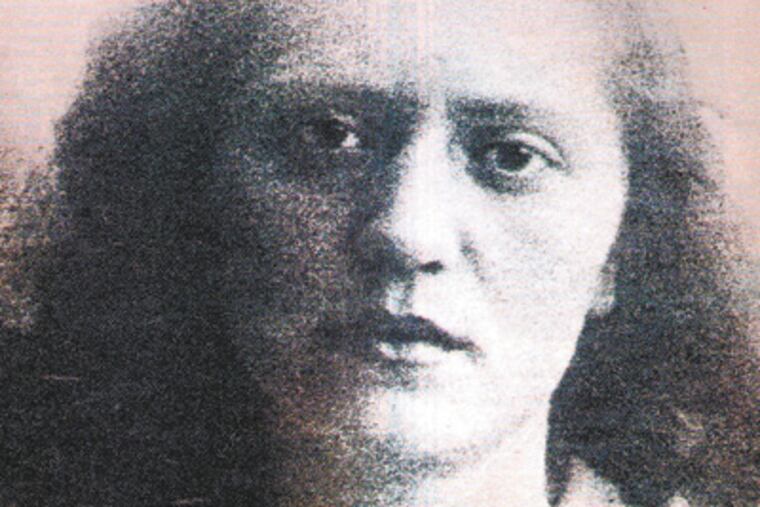A life shedding light
Halina Wind Preston lived the horror that is the film "In Darkness." She went on to testify to evil and goodness.

The Polish filmmaker Agnieszka Holland wrote to me in January 2010, before filming began on her new movie.
"Believe me, I know the importance of your mother's achievements and I deeply value them," she wrote.
"The reason she's not in the script is that we had to compress and partly fictionalize the events and characters in order to make the story compact and interesting. . . . We didn't want to add some fictional story line to her, knowing how important a Holocaust figure she became after the war because of her own activity and your writings."
Holland was referring to In Darkness, which opened Friday in Philadelphia. A nominee for best foreign-language film at this year's Academy Awards, it is a fictional treatment of the central episode in my mother's life.
On July 27, 1944, my mother emerged with nine other Jews from a sewer manhole in the Polish city of Lvov (present-day Lviv, Ukraine) after hiding from the Nazis, below ground, for 14 months. My article "A Bird in the Wind," published in the old Inquirer Magazine (pdf here) on Mother's Day 1983 - five months after my mother's death - was the first full English-language account of this episode.
Halina Wind, the daughter of a poor Hasidic watchmaker in the Carpathians, was just 22 on the day the Russian army liberated Lvov, and already she had been witness to the worst and the best in humanity. Her parents and a brother were among the millions murdered, and she had narrowly escaped the same fate before fleeing into the sewers. She survived because three Polish sewer workers - Leopold Socha, Stefan Wroblewski, and Jerzy Kowalow - risked their lives and their families' lives to shelter and feed her group.
"Your mother kept pleading that she is a young girl and that she wants to and must live," Wroblew-
ski recalled in a long letter to me in 1983 (in Holland's film he is killed, but in reality he lived to be 74). My mother's role in history is significant not so much for what she did during those 14 subterranean months but for how the experience guided her life after the movie's story ends.
Throughout the time in the sewer, Halina remained focused on a place she had never seen, the New York address 3080 Broadway, where her older brother, Leon, was studying at the Jewish Theological Seminary of America. The prospect of reuniting gave her something to live for, and when she arrived into the waiting arms of Rabbi Wind and his wife and son at LaGuardia Airport on Jan. 3, 1947, it marked the beginning of a new life dedicated to honoring both her Jewish heritage and her Catholic rescuers.
An American audience first heard a survivor speak of the Lvov sewer episode on Oct. 25, 1949, when Halina, then a 27-year-old senior in the Jewish Theological Seminary's teachers institute, told her story at a national conference in New York. Charming, cultured, and beautiful, she made such an impact that the seminary sent her on a fund-raising tour of 36 appearances in seven states. After her presentation in Roxbury, Mass., the Boston Sunday Globe published a front-page story: "Woman Lives to Tell of 14 Months in Sewer."
One woman who heard her in Camden introduced her to a cousin who had survived Auschwitz and Buchenwald and who was working as an engineer in Boston. Halina married George Preston, the former Grisza Priszkulnik. They moved to Wilmington when he took a job with DuPont. I was born there in 1955, my sister six years later.
During three decades as a teacher at Jewish schools and as a public speaker, my mother inspired students and audiences of all faiths with the story of the Lvov sewer workers who saved her, establishing herself as an eloquent representative of the victims and survivors of the Nazis. Her message was uplifting, about how goodness transcends religion, ethnicity, and national boundaries, continuing from one generation to the next, from one culture to another.
My mother maintained contact with the Socha and Wroblewski families, and would have done the same with Kowalow had he not disappeared after the war. As a boy I watched her meticulously prepare parcels of clothing for the two families living in Soviet-occupied Poland. In 1977, she traveled to Yad Vashem in Jerusalem to provide the sole testimony that led to Socha and Wroblewski and their wives' being named "Righteous Among the Nations," enabling their families to receive monthly stipends.
And in 1981, a year before her death, she dedicated a Garden of the Righteous Gentiles at Wilmington's Jewish Community Center, with two of its trees planted in memory of Socha and Wroblewski, the first memorial in the United States to Christians who saved Jews.
Sister Jeanne Cashman, an Ursuline nun who runs a homeless center in Wilmington, e-mailed me Sunday after an article of mine about my mother appeared in the Los Angeles Times.
"I first met your mother when I invited her to Ursuline Academy in the late '70s to speak to my senior theology classes," she wrote. ". . . Their lives were changed forever on an ordinary Tuesday afternoon. . . . They are far better women and mothers and professionals than they would have been were it not for that chance encounter with Halina Wind Preston."
Cashman today serves on Wilmington's interfaith Holocaust education committee, named for my mother.